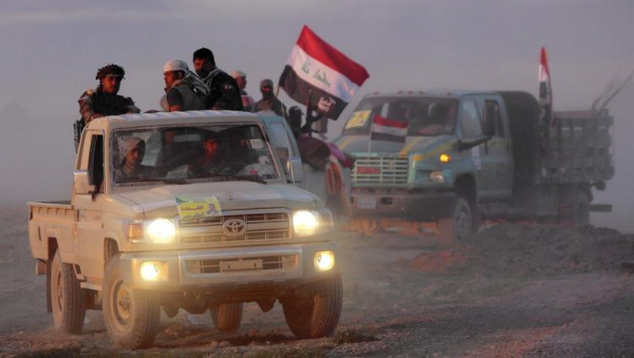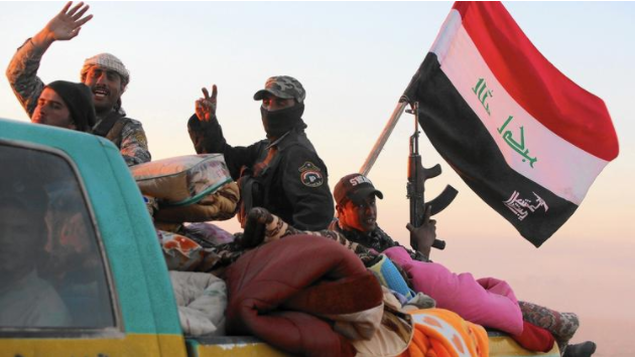As many as 30,000 Iraqi soldiers and Shiite Muslim militia fighters supported by Iranian military advisors, artillery and rocket launchers started a ground and air assault last week aimed at retaking the strategic city of Tikrit, which fell to militants last summer. No U.S. warplanes are involved in the operation, though they have been carrying out airstrikes against Islamic State positions in Iraq for seven months.
The Iraqi attack is the largest and most ambitious by far since Islamic State fighters stormed out of Syria last year and quickly captured 10 cities and vast amounts of territory in Iraq, abruptly pulling the Obama administration and a coalition of allies into the war.
Tikrit is viewed as a pivotal foothold for an expected assault on Mosul, one of Iraq's largest cities and the militants' self-declared capital in Iraq. The Pentagon already has divulged plans to support that operation with airstrikes and possibly special operations teams.
But the fighting that began Monday on the outskirts of Tikrit, about 90 miles northwest of Baghdad, highlights a deepening divide between the United States and Iraq over the conduct and pace of the war.
Senior U.S. officials worry that the Iran-backed Shiite militia fighters will carry out reprisals against Sunni residents in Tikrit. Sentiment remains strong there for Hussein, the executed former ruler, as does hostility to the current Shiite-led government in Baghdad.
Soldiers in the attacking force also may seek revenge against Sunnis for the massacre last summer of more than 1,000 Shiite soldiers assigned to Camp Speicher, a former U.S. military base outside Tikrit.
"We're watching carefully," Gen. Martin Dempsey, chairman of the Joint Chiefs of Staff, said at a House Armed Services committee hearing Wednesday. "If this becomes an excuse to ethnic cleanse, then our campaign has a problem and we're going to have to make a campaign adjustment."
Since last summer, Iran has sent fighters and weapons to the front lines to help rally Iraqi forces and push Islamic State back from the Kurdish city of Irbil and the outskirts of Baghdad. Iranian warplanes have made limited airstrikes on targets near its borders with Iraq.
But Iran's role has grown far more overt in the operation to reclaim Tikrit.
Photos of Maj. Gen. Qassem Suleimani, commander of the Quds Force, an elite unit in Iran's Republican Guard Corps, supposedly drinking tea outside Tikrit, appeared online last week. His role in the battle is unsettling for U.S. officials, who twice declared Suleimani a terrorist and accused him of directing deadly attacks on U.S. forces in Iraq a decade ago.
That's created a quandary for the Obama administration. U.S. officials are eager for Iraq to fight its own battles. But they worry that Iran's growing involvement will fuel another sectarian bloodletting, pitting battle-hardened Shiite militias against Sunni tribes and Kurdish factions in the north.
"We've been down the road of sectarianism in Iraq, and it's important that the government of Iraq today not go down that road again," Defense Secretary Ashton Carter told the Senate Armed Services Committee. "So we need to have success against [Islamic State], but we need to have it in a way that doesn't inflame sectarianism again."
Since reengaging in Iraq in August, the Obama administration has limited U.S. assistance to airstrikes, training Iraqi troops, sharing intelligence and supplying weaponry. The administration has approved nearly $15 billion in sales of M1A1 Abrams tanks, fighter jets, attack helicopters and other equipment to Baghdad, although Congress has not approved all the sales.
It has sent about 3,000 military advisors to Iraq, but they operate in command centers and on training bases. They are barred from accompanying Iraqi units on ground operations.
"Iran is moving to fill that vacuum with their proxies, primarily Shia militias," said Christopher Harmer, a military analyst at the Institute for the Study of War, a nonpartisan public policy group in Washington.
"The question is, if [Islamic State] is evicted from Tikrit, and possibly even from all of Iraq, how much influence will Iran then have over the Iraqi government? Keep in mind that Iran has been a state sponsor of terror for much longer than [Islamic State] has existed," he said.
Thousands of civilians have fled Tikrit, and fighting so far has not extended into the city center. Iraqi Prime Minister Haider Abadi has promised amnesty to residents who had been forced to join Islamic State.
The U.S. has called for Iraqi officials to ensure that the militias protect civilians and property.
Iraqi officials say U.S. concern about of a sectarian bloodbath is exaggerated, noting that Sunni tribal militias are also in the attacking force and that prominent Sunni officials, including the provincial governor, support the attack.
"The more local tribal fighters take part in the operation, the less likely the eruption of any sectarian strife," said Mowaffak Rubaie, a former national security advisor who is now a member of the Iraqi parliament. "On balance I suspect there will not be significant sectarian killings after liberating Tikrit, but there will be house-to-house searches, which may create some friction."
But even if the operation in Tikrit goes well, disagreements over strategy against Islamic State are likely to persist, and Baghdad's reliance on help from Iran is likely to grow.
"It is a very good sign that Iraqis are taking the lead in this operation and future operations," Rubaie said. "We will call for the American help when we need it."



 RSS Feed
RSS Feed